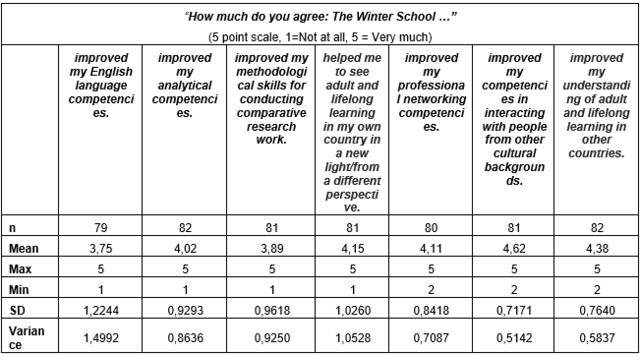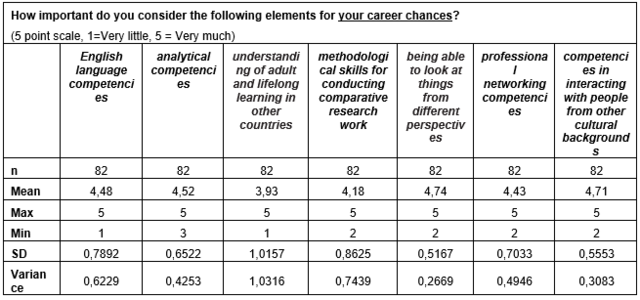Evaluation 2016
Evaluation results - Adult Education Academy (former Winter School) 2016
Summary of the evaluation
The Würzburg International Adult Education Academy targets both Master and PhD students in the field of adult education and related disciplines. It intends to support the development of highly qualified researchers and practitioners in the field of adult learning who are able (and motivated) to work in international environments and who are able to appropriately address international topics in their work, further studies or researches.
The external evaluation focused on three aspects: outreach of the Adult Education Academy, participant satisfaction and impact of the IWS. It involved a written participant survey as well short interviews with selected participants.
The Adult Education Academy 2016 was attended by 91 participants from 19 countries. Roughly two thirds of them were Master students, one third were PhD students. About one third of the participants came from non-European countries (which were enrolled as exchange students at University of Würzburg, R. E.). Most participants had already dealt with international topics at least to some extent, but for about one half of the participants this was their first international study mobility. Participants’ motivations for attending the Adult Education Academy were multidimensional but the desire to meet people from other countries and to learn about other countries were particularly stressed.
The evaluation showed very high satisfaction levels of the participants concerning the Adult Education Academy as a whole as well as its single parts. As regards the Adult Education Academy’s impact, participants felt that the Adult Education Academ had considerably contributed to enhancing their competences in many regards. Most notably, increased competence for intercultural interaction was highlighted as outcome, but also the development of other competences, both content-related and transversal ones, was felt to have been promoted by the Adult Education Academy. Participants also considered that the competences which were promoted by the Adult Education Academy were highly relevant for their further career chances, thus contributing to their employability. After attending the Adult Education Academy, participants also felt more motivated to engage with international topics in their studies or future professional activities as well as to undertake further study mobilities.
In conclusion, the evaluation showed that the Adult Education Academy reached a high number of its target audience, involving different countries of origin, study levels, motivations and degrees of previous international experience. By all these groups the Adult Education Academy was perceived as a high quality event which had much to offer for their own academic/professional as well as personal development.
Author: Susanne Lattke, German Institute for Adult Education, comment R.E.: Prof. Regina Egetenmeyer, Julius-Maximilian University of Würzburg
Further information about the evaluation of 2016
Extraction of the external results,
which was conducted by German Institute for Adult Education, Susanne Lattke
COMPALL-Project Coordinator: Julius-Maximilian University of Würzburg, Prof. Dr. Regina Egetenmeyer
Participation in the 2016 Winter School
The Winter School 2016 was attended by 91 participants from 19 countries. Of these, 82 participants filled in and returned the questionnaire, corresponding to a response rate of approx. 90%. Master students (51 respondents) outnumbered PhD students (23). The proportion of Non-European participants (at least 25) was considerable, but the focus was clearly on participants from European countries (at least 50).
Participants’ Satisfaction
The overall satisfaction with the Winter School was very high. The overall means was 4.20. Participants also appreciated the opportunity to learn about international concepts and about the situation in other countries and to get new ideas and perspectives. Another aspect which was highlighted was the active involvement of students through group discussions, group/team work and self-responsible work of students.
Participants’ Competence Development
The ratings show that respondents feel the Winter School has considerably contributed to their competence development. The lowest – but still high – mean values were obtained by English language competencies” (mean 3.8) and methodological skills for comparative research (3.9). All other items – analytical competencies, being able to see adult education in one’s own country in a new light, professional networking, interacting with people from other cultural backgrounds, and understanding adult education/lifelong learning in other countries - scored above 4. Overall, participants judged their academic and personal outcomes from the Winter School very positively (means of 3.7 for academic and 4.3 for personal outcomes). The overall picture thus shows that respondents feels they have obtained a broad range of learning outcomes with the foci being very much in line with the intended aims of the Winter School.

Impact Career on Career Chances
All competencies were attributed a high importance by the respondents with the mean values ranging from 3.93 to 4.74. If one compares, how respondents rated the career relevance of the different competencies addressed by the Winter School on the one hand, and how they assessed the Winter Schools’ contribution to developing exactly these competencies on the other hand (see section 4.2.2) one can conclude that the Winter School made a significant contribution to enhancing the participants’ future career chances.

Summary of external Evaluation
The evaluation showed very high satisfaction levels of the participants concerning the Winter School as a whole as well as its single parts. As regards the Winter Schools’ impact, participants felt that the Winter School had considerably contributed to enhancing their competences in many regards. Most notably, increased competence for intercultural interaction was highlighted as outcome, but also the development of other competences, both content-related and transversal ones, was felt to have been promoted by the Winter School. Participants also considered that the competences which were promoted by the Winter School were highly relevant for their further career chances, thus contributing to their employability. After attending the Winter School, participants also felt more motivated to engage with international topics in their studies or future professional activities as well as to undertake further study mobilities.
In conclusion, the evaluation showed that the Winter School reached a high number of its target audience, involving different countries of origin, study levels, motivations and degrees of previous international experience. By all these groups the Winter School was perceived as a high quality event which had much to offer for their own academic/professional as well as personal development.


